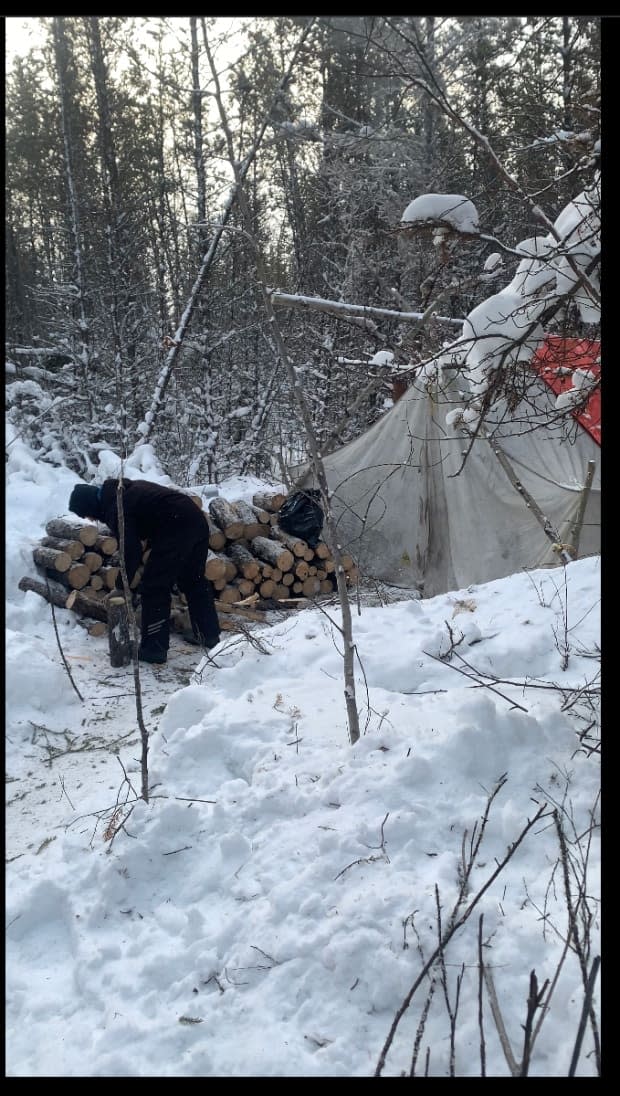Sask. First Nations rally behind northern community in dispute with uranium company

Saskatchewan First Nations are rallying behind the Birch Narrows Dene Nation in its dispute with the provincial government and a uranium exploration company.
Birch Narrows officials blockaded a road and issued a cease and desist order against Toronto's Baselode Energy, saying Baseload workers started conducting tests without the consent of the northern Saskatchewan First Nation.
"We're not back in the 1800s anymore. They can't do this stuff to us," said Elder Ron Desjardin, who discovered a work crew on one of Birch Narrows' traditional trap line routes earlier this month.
The blockade has been removed, but Birch Narrows members say they're conducting regular patrols.
Little Pine First Nation Chief Wayne Semaganis is one of many leaders offering support to Birch Narrows.
Semaganis said the issue is personal, as his wife is from Birch Narrows. He said similar violations are occurring across the province on First Nations territory, and they need to stop.
"How you're treating First Nations when it comes to the lands and the resources and everything else, the whole relationship between First Nations and non-First Nations has been wrong," Semaganis said.
Indigenous people aren't anti-development when it comes to resource projects, he said — they just want to be treated with respect.
"We have to get back on the right track. If we've made mistakes, let's correct them and let's find the right way of working together."

Semaganis said the consultation rules set by the provincial government are unrealistic and unfair. A First Nation does not have the resources to reply in detail to a development proposal in the short time frames allowed.
It takes time for First Nations to develop relationships, consult their members and collect accurate wildlife data or other information for proposals that could "affect the land permanently," he said.
Other leaders echo concerns
Other First Nations leaders voiced similar concerns in written statements Tuesday.
"The province needs to provide the already underfunded First Nations with the financial resources to be able to participate at the table in a meaningful way," said Meadow Lake Tribal Council Tribal Chief Richard Ben.
"Otherwise, many First Nations will be left out of the process. We can't undertake studies at our own expense in order to be consulted on resource development within our territory."
Federation of Sovereign Indigenous Nations Vice-Chief Heather Bear said such practices "won't be tolerated anymore, as our connections to the land, water, animals and environment is paramount."
Treaty 10 leaders and others are demanding the provincial government harmonize its policies with recent court rulings on Indigenous rights, as well as the United Nations Declaration on the Rights of Indigenous Peoples, as have British Columbia and other jurisdictions.
"At a minimum, Saskatchewan is bound by its purported commitment to reconciliation," read the Treaty 10 statement.
University of Saskatchewan law college lecturer Benjamin Ralston said this week that Canada's Constitution and emerging case law are clear: First Nations concerns must be front and centre on any development affecting them.
Ralston said inherent and treaty rights override any provincial permit process. That's why provincial governments and resource companies are better off working in good faith with First Nations than risking a time-consuming, expensive court battle they may not win, he said.
A Baselode official says the company obtained all provincial permits, but said consent of the communities affected is essential. He said the work will not proceed unless Birch Narrows agrees.
The provincial government said Birch Narrows was given ample time to voice any concerns, and RCMP could be called to intervene in any illegal blockades. They said this is an exploration phase and there will be no drilling or digging.

